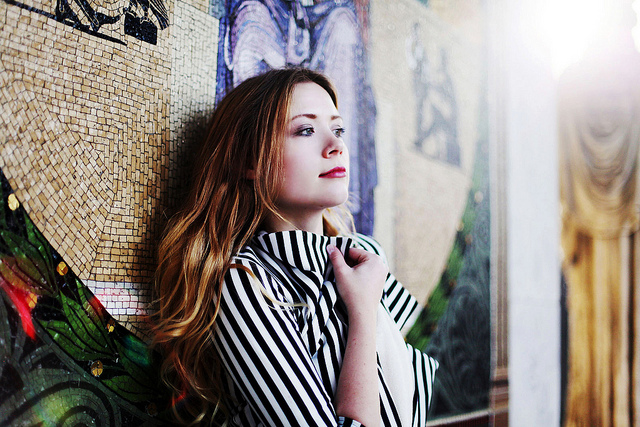There was a point in my life when I felt an emptiness—a void that longed to be filled.
I felt incomplete and unfinished, and it ate at me inside. I would wake up and feel a sense of lack and unfulfillment—an if only something would shift in me, then perhaps my life would have some deeper sense of meaning.
I’d been doing yoga, and I had moments of wholeness on the mat. I wanted more of those moments—but, despite a dedicated daily practice, they failed to increase. Instead, I was faced with more of my longing and lacking self, in a way that made me feel uncomfortable and insecure. I felt as if life had an expectation of me that I just didn’t quite get. To live this way felt unsettling.
A year and a half before this sense of lack began to eat at me, I lost my sister, Rebecca, suddenly. While sudden death can be shocking, it can also be revelatory. Something in me let loose—gave way in a manner so delicate and subtle that I barely noticed its existence, until I met mindfulness.
My sense of lack might connect with your sense of lack—it’s actually ours, as a collective, lacking wholeness. We are seeking, and we are the seekers. In the story of The Alchemist, the protagonist journeys away from home, only to find what he was looking for was right under his nose the whole time. My story—your story—is kind of like that. And yet, we need each others’ stories to help us remember that we have it—that thing that we feel we might not have.
We think that we might have to buy a book or poem to tell us, to go to church to remember, to have a love affair to figure out—to even detoxify our body to understand. But what if none of these things is the answer? What if all of these things are merely distractions to the present and pulsing sense of purpose and wholeness that is alive in our beating-heart, thinking-mind, hungry-belly selves right this very moment.
Before I go on, I invite you to pause. Let’s you and me just stop and take a breath together.
Go on…I’ll join you. Nice long breath in. Now hold it—1, 2, 3, 4, 5, 6—and slowly, very slowly, exhale.
Now do that again, on your own. Close your eyes. Notice your sit bones rooted, your feet grounded, the length of your spine, and the space at the very top of your head. Notice your whole self—your body, your heart, your breath.
Now breathe in for as long as you can—keep breathing in. Okay, now hold for six seconds—slow pause—and now long letting go.
Here we are, you and me—us, breathing together. Being together. In our bodies together. We can feel our hearts beating. We are alive. Our bodies have a lot of sensations. We don’t even have to get caught up in sensation—we just have to be present with ourselves—all of who we are—a myriad of thoughts, feelings, and physical sensations.
Need I go on? It’s so simple, right? So simple, and yet made so complicated by the fabulous analytical aspect of our human brains. It is such a gift to be able to think in an abstract way—such a blessing. And yet, in that deep blessing, lies a twisted curse.
We somehow, over the centuries, have become at war with our minds. We somehow, as a human race, have started an all-out battle with that sacred and stately tool that could be our key to freedom. The way out? Remember what you just did a few moments ago? Where did that take you? Most likely not away from the present moment, but deeper into it.
Mindfulness is the newest buzzword in the therapy community, and it is becoming widely embraced, researched, and understood as a great tool in healing and overall wellness in the medical community. There is a reason mindfulness is expanding to the degree that it is in our current time—it is desperately needed.
My first major loss—that of my grandmother, two years before the loss of my sister—sent me into a major depression and led to a suicide attempt. I think that deep down, I was terrified of going to that place again—so terrified, I latched on to whatever I could to hold me up high and keep me from diving back into that darkness.
At the time, it was yoga. Every time I got on my mat, there I was: that person I had been wrestling with in those off-the-mat moments—the tense-muscled, anxious-minded, lonely, yearning-heart self. I could somehow face her with deeper ease, breath by breath. In fact, there was a kindness and curiosity to the way I faced her that somehow began to bleed into how I was facing her in those everyday moments.
When we become present in meditation, which could simply be a few minutes of focused breathing, connecting with our inner sensations—or in yoga, whatever style we prefer, or hiking mindfully along a favorite nature trail—we enter more fully into the full essence of who we are as human beings.
Being present is not only a practice—it is a way of life. It is the way we are meant to live on this planet.
We humans have a lot of catching up to do. I believe we are getting there—we are catching up fast, as the exponential expansion of mindfulness tells us. I am currently pursuing my master’s degree in mental health counseling, and every one of my professors is a proponent of mindfulness—even, or perhaps most importantly, the psychiatrist on our staff. For me, it triggers comfort and hope when a Western-based doctor sees and embraces the power of mindfulness in his practice.
What I ask you, as a reader, is—how can you be more present with yourself, each and every day? Because the truth is, we can always be more present. We are social creatures. Presence—mindfulness—is not something we can do on our own. We need each other, not only as reminders, but for support, encouragement, and strength.
After my younger sister’s death, I never feared going back into that darkness I felt sucked into when my grandmother died. I never feared it, because mindfulness had wrapped its open, giving, supportive arms around me. I felt held and nourished more and more often. And when I didn’t—well, I knew where I could go to receive it: back to my practice, which had begun to spin itself into all areas of my life.
Suddenly, a trip to the farmer’s market or the long drive to my college campus felt like a meditation; I was present with myself. And presence didn’t mean I was always at peace. Presence simply means that I am with myself. I am somehow my own cheerleader through my inner storms.
I’m going to share a few ways that allow me to be more present in my everyday life, but I encourage you to comment with some ways that work for you too. We are all so fabulously unique—and yet, in our core, we are all the same. Share your loves and passions, for they just might ignite the mindful presence of another.
Human heart to human heart, if we find joy, presence, and acceptance—how can we not want to share it? In the sharing, there is an exchange of energy—a dance. That dance just keeps getting bigger. I want to see how big it can get. I think someday, it will be so big that it will take over the world, and then, the human race will just be another group of sentient creatures being lovingly present on this planet.
My favorite mindfulness practices:
Yoga and meditation. I’ve been doing these practices since 1998. I started teaching them in 2006. I kind of feel like I’m in an exclusive relationship with them now. I do them now in small doses throughout the day, instead of as a long chunk of practice time.
For me, it’s almost a reset. I roll out my mat, blankets, and a few bolsters and put on some music (or no music at all)—or perhaps even an inspiring Ted Talk, light a candle, and give myself some time, however much time feels right, to be with my whole self by anchoring in my breath.
There are so many ways to play with setting up your yoga time. I’ve found ritualizing it a bit with a candle, and maybe some incense, makes it a bit more sacred and mindful to me. What works for you?
Being in nature. Nature is my go-to reset. I feel that as soon as I step into the woods, my mind is cleared. I feel more energized and at peace with myself—and of course, the air is so clear and fresh. The oxygen boost alone is a reason to venture into the woods.
Sometimes I walk slowly and mindfully, sometimes I trail run, and sometimes I choose a really hilly trail to get more of a cardio hike in. But no matter how I choose my nature time, I always stay mindful. I tend to take little pause breaks, maybe snapping a shot to share on my Instagram, or stopping to pick and eat some pine needles. (Yep, I do that—evergreens are super yummy—cringe if you will, but not until you’ve tried them!)
Choose your favorite place—the beach, a lake, even your garden. Dip your bare toes into the earth and breathe. I guarantee you will become present and mindful quicker than you can exhale!
Pouring your heart out to a friend. Social support has been proven to decrease symptoms of depression and anxiety, and even physical health issues. Remember, we are social creatures. We weren’t designed to live in caves all of our lives. Even bears come out of their caves!
I find scheduling one-on-one friend dates, phone calls, email sessions, where we can both pour our hearts out to each other, leaves me feeling lighter, freer, and more connected, not only with that other person, but with my deepest self.
I think the piece most of us struggle with is the being needy role. How can we expect not to need just as much as we are needed? And for those of us (I’m definitely in this category) who are highly empathic and feel at home as listener, giver, helper, and healer—can we challenge ourselves and ask for help or support at least once this week?
What happens when we ask is amazing. We learn to receive, which actually makes us more available to give, when that is required of us. Remember, it’s a dance. We give, we receive—and then, we can do it all over again. It’s a process of expanding our awareness of our own patterns in a way that makes us…well, more mindfully present with the idiosyncrasies that make us who we are as unique humans living, breathing, and being on this planet—together!
~
Author: Sarah Lamb
Image: Flickr/lauragrafie
Editor: Yoli Ramazzina


 Share on bsky
Share on bsky





Read 0 comments and reply